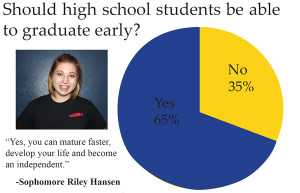‘Post-Human’ generation develops technology addiction
Between text messaging, voice mail and e-mail, technology is drowning out the sound of the human voice.
Whether its updating Facebook, Instagramming food, or fangirling over One Direction on tumblr, today’s generation is wired in.
In a matter of minutes you can search the web, check Gradespeed, and buy a ticket for Skyfall-all on the same device. Although the technology available may be beneficial, the cost at which you get it outweighs the convenience.
Try to call customer service at any major corporation and the first voice you hear is that of a monotonous automaton. The human interaction that was present in the good ole’ days has now been replaced with buttons and machines sending the caller on a wild goose chase in search of an actual human being. Thus prompting the media to label this as ‘the post-human’ generation.
But what can they expect from people that have been molded by exposure to growing technology since birth?
A 2011 University of Maryland study that asked students (ages 17-23) to give up phones, laptops, and TVs for a mere 24 hours ended in anxiety attacks and depression. It has become clear that today’s generation is addicted to technology.
One in every five students surveyed said they exhibited symptoms of withdrawal, which one participant described as “itching like a crackhead”. Another student confessed, “I am an addict. I don’t need alcohol, cocaine, or any other derailing form of social depravity…Media is my drug.”
Technology has consumed today’s generation and the fact that this consumption has reached a point where people are comparing it to the effects of drugs is startling.
However, a number of students found that when all their technological gadgets were out of the way they were able to have more in-depth conversations. Researchers say this is due to the effects that technology has on children’s and teenager’s development.
The average American between the ages of eight and 18 spend more than seven hours in front of a screen, whether it be a computer, TV, or phone.
Dr. Donald Roberts, a professor of communications at University of Stanford, said that when they conducted a similar study five years before, they thought children’s screen time couldn’t get any higher “but it just keeps going up and up.”










